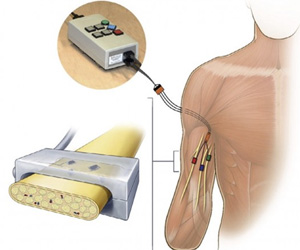The idea is that interactive artificial intelligence will help prostheses to recognize human intent better, register their surroundings, and to continue to develop and improve over time.
It𠏋 all in the Mind: Mind Controlled Prosthetics
The technology behind prosthetics for upper limbs has come on in leaps and bounds over the past decades. Using surface electromyography, skin electrodes at the remaining stump of the arm can detect the slightest muscle movements. These biosignals can be converted and transferred to the prosthetic limb as electrical impulses.
Advertisement
The wearer controls their artificial hand themselves using the stump. Methods taken from pattern recognition and interactive machine learning also allow people to teach their prosthetic their individual needs when making a gesture or a movement.
At present, advanced robotic prosthetics have not yet reached optimal standards in terms of comfort, function, and control, which is why many people with missing limbs still often prefer purely cosmetic prosthetics with no additional functions.
Researchers concentrate in particular on how to improve control of both real and virtual prosthetic upper limbs. The focus is on what is known as intent detection. They are continuing work on recording and analyzing human biosignals, and are designing innovative algorithms for machine learning aimed at detecting the individual movement patterns of individuals.
Previous studies conducted on persons both with and without physical disabilities are used to validate their results. Furthermore, shared autonomy between humans and robots were aimed at checking the safety of the results.
Researchers are exploiting the potential offered by intent detection to control assistive and rehabilitative robotics. This covers wearable robots worn on the body such as prosthetics and exoskeletons, but also robot arms and simulations using virtual reality.
Source: Eurekalert



